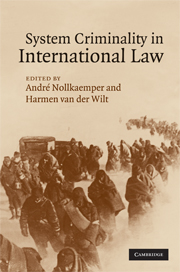Book contents
- Frontmatter
- Contents
- Preface
- Table of cases
- Table of treaties and international instruments
- List of abbreviations
- List of contributors
- 1 Introduction
- 2 The policy context of international crimes
- 3 Why corporations kill and get away with it: the failure of law to cope with crime in organizations
- 4 Men and abstract entities: individual responsibility and collective guilt in international criminal law
- 5 A historical perspective: from collective to individual responsibility and back
- 6 Command responsibility and Organisationsherrschaft: ways of attributing international crimes to the ‘most responsible’
- 7 Joint criminal enterprise and functional perpetration
- 8 System criminality at the ICTY
- 9 Criminality of organizations under international law
- 10 Criminality of organizations: lessons from domestic law – a comparative perspective
- 11 The collective accountability of organized armed groups for system crimes
- 12 Assumptions and presuppositions: state responsibility for system crimes
- 13 State responsibility for international crimes
- 14 Responses of political organs to crimes by states
- 15 Conclusions and outlook
- Index
12 - Assumptions and presuppositions: state responsibility for system crimes
Published online by Cambridge University Press: 08 October 2009
- Frontmatter
- Contents
- Preface
- Table of cases
- Table of treaties and international instruments
- List of abbreviations
- List of contributors
- 1 Introduction
- 2 The policy context of international crimes
- 3 Why corporations kill and get away with it: the failure of law to cope with crime in organizations
- 4 Men and abstract entities: individual responsibility and collective guilt in international criminal law
- 5 A historical perspective: from collective to individual responsibility and back
- 6 Command responsibility and Organisationsherrschaft: ways of attributing international crimes to the ‘most responsible’
- 7 Joint criminal enterprise and functional perpetration
- 8 System criminality at the ICTY
- 9 Criminality of organizations under international law
- 10 Criminality of organizations: lessons from domestic law – a comparative perspective
- 11 The collective accountability of organized armed groups for system crimes
- 12 Assumptions and presuppositions: state responsibility for system crimes
- 13 State responsibility for international crimes
- 14 Responses of political organs to crimes by states
- 15 Conclusions and outlook
- Index
Summary
This chapter examines state responsibility for system criminality: that is, the remedies available under international law should a state order or encourage, permit or tolerate the widespread or systematic commission of international crimes, even if these are lawful under its domestic law. The analysis here is restricted to acts which threaten core values of international society, such as genocide, torture, and widespread or systematic violations of the law of armed conflict which amount to crimes against humanity. This chapter does not discuss individual criminal responsibility for acts that amount to international crimes, but rather examines the possibilities of engaging the responsibility of the allegedly delinquent state.
As Nollkaemper points out, state responsibility is neither criminal nor civil as we conceive these in domestic legal systems. At its core, a finding of state responsibility simply records that the delinquent state has committed a breach of general international law which binds all states, or of a specific legal obligation which binds two or more states. The aims of the ascription of responsibility to a state for system criminality encompass the termination of the unlawful conduct and prevention of its repetition; the vindication and confirmation of fundamental norms of the international legal system; and the reconciliation of the entities and individuals implicated in the delict, whether as perpetrators or injured. Given these objectives, can the law of state responsibility provide an adequate response to acts ‘performed in response to orders from authority that [are] considered illegal or immoral by the larger community’?
- Type
- Chapter
- Information
- System Criminality in International Law , pp. 270 - 297Publisher: Cambridge University PressPrint publication year: 2009
- 3
- Cited by

